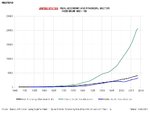you do realise bond yields are gona be pushed to near 0 soon yeh?
And i can think it though, perhaps better than you? Hence i dont follow the main stream internet forum, youtube theory of hyperinflation.
Hmmm.
Reuters have reported no less a figure than Alan Greenspan saying that:
" Greenspan said the subdued symptoms of fiscal excesses is fostering a sense of complacency that could have dire consequences for the U.S. economy.
U.S. Treasuries are nevertheless free of credit risk. However, they are not free of interest rate risk, according to Greenspan, who is no longer a policy maker but is still listened to by the markets.
"If Treasury net debt issuance were to double overnight, for example, newly issued Treasury securities would continue free of credit risk, but the Treasury would have to pay much higher interest rates to market its newly issued securities," he said.
Greenspan, who was the chairman of Federal Reserve for about 19 years until his retirement in 2006, said he agreed that low long-term interest rates could continue for months.
"But just as easily, long-term rate increases can emerge with unexpected suddenness," he added.
http://in.reuters.com/article/idINIndia-49437420100618
Now Nigel, you are possibly thinking that the current artificially low interest rates are an attempt to fight off deflation, and you are correct. No argument about that. But where your half-pissed and fuzzy reticular system is letting you down, is in the insight stakes.
Do you think the USA and the UK (to name just 2 of the posse) will be successful in their use of interest rates to defeat deflation?
Is that a "yes" I hear, or a "dunno".
If it is a "dunno" then you may phone a friend, but a grade four pupil could tell you that once a number reaches zero(such as current interest rates) then that's about the limit.
The only tool left for them is Quantitative Easing. The lowering of interest rates did not help Japan and it won't help the USA. Of course I hear your foggy response, that Japan has had a protracted period of deflation - you can read that in any Economics 101 text.
The USA (and vicariously the UK) wish to avoid that, so they are attempting to stimulate the economy before deflation sets in, or whatever name you want to give it to display your economic literacy. The problem is that all the money printed will have to be sucked up again at some stage, and as Al Greenspan says, they will not want to raise taxes to do that.
Now, Nigel, pay attention for a bit mate.
Greenspan again:
U.S. Treasuries are nevertheless free of credit risk. However, they are not free of interest rate risk ... If Treasury net debt issuance were to double overnight, for example, newly issued Treasury securities would continue free of credit risk, but the Treasury would have to pay much higher interest rates to market its newly issued securities," he said.
Now what do you suppose the
higher interest rates might be that the
G-O-V-E-R-N-M-E-N-T might have to pay would be called?
If you answered "Higher Bond Yields" then you may move forward to the next round, and you have locked in $100 dollars.
You see, recently, Bond Yields began to rise, and currently are settling a tad, as the Eurozone is having a bit of a tiff with their own yields a la Greece.
Greenspan said:
"Long-term rate increases can emerge with unexpected suddenness. Between early October 1979 and late February 1980, for example, the yield on the 10-year note rose almost four percentage points."
Yes. Plus, in the same year, 30-year Treasury bond yields rose five percentage points; Treasury bill rates catapulted from 6 percent to 16 percent in six months; and the prime rate hit 21.5 percent.
It is unlikely that yields would catapult that far, that quickly, but its a possibility we need to consider. If Bernanke and Geithner-guts get it wrong, then it's "game-on".
Don't be too short-sighted Nigel - just because there has been a bit of a contraction lately, don't think Yields can't blow out - you need to understand that the long term inflation rate is joined at the hip with the long term Bond rate.
If you are so confident, then you don't need to use another lifeline.
But you may need to ask the audience.
On this question, you do not have the 50:50 option, because to get it wrong would be catastrophic, and you must leave the show with the $100 that is locked in.
Before we go to the question, I bet you didn't even listen to this valuable interview, posted by Bevok:
http://kingworldnews.com/kingworldnews/Broadcast/Entries/2010/5/28_Felix_Zulauf.html
The question:
"If Treasury Bonds are so safe, and yields are rising to entice buyers to loan governments money, doesn't this paradoxically imply increasing risk of sovereign default, no matter how small, in purchasing Government Bonds?"
To help you, I would add: "Treasury yields increase, in order to attract purchasers, and long term inflation is linked solidly to the long term Bond rate. Given that the USA has precious little cash left to stimulate their economy, (though they do have more reserves than the UK) then the rising Bond Yields will indicate an increasing risk of sovereign default - regardless of the country selling the Bond."
Oh - and by the way - the USA has borrowed externally to fund their excesses, while Japan has drawn on the savings of their citizens to effect the same stimulus (which also failed), so you may not use that as a part of your answer.
Think carefully, Nigel.
Your time starts ... now!
If this chart does not chill you, then you are out of the next round, and can leave.

